Aspilidea myrinii (Fr.) Hafellner
in Hafellner & Türk, Stapfia, 76: 149, 2001. Basionym: Parmelia myrinii Fr. in Myrin - Skandia, 6: 25, 1835.
Synonyms: Aspicilia adunans (Nyl.) Arnold; Aspicilia cinerea var. alpina (Fr.) Körb.; Aspicilia glacialis (Arnold) Dalla Torre & Sarnth.; Aspicilia myrinii (Fr.) Stein; Lecanora adunans Nyl.; Lecanora myrinii (Fr.) Tuck.
Distribution: N - Frl (Tretiach & Hafellner 2000), TAA (Nascimbene & al. 2022), Lomb (De Vita & Valcuvia 2004, Delucchi & Valcuvia 2004, Valcuvia & al. 2003), Piem (TSB 34356), VA (Piervittori & isocrono 1999, Matteucci & al. 2013, 2015c).
Description: Thallus crustose, episubstratic, white, grey, yellowish grey or ochraceous, turning pale pink in the herbarium, rimose to verrucose-areolate, rather thick, often forming very large patches, usually delimited by a dark prothallus. Cortex 20-40 µm thick, paraplectenchymatous with elongated cells, sometimes covered by a thin epinecral layer; medulla white, I+ pale blue. Apothecia aspicilioid-cryptolecanorine, immersed in the thallus to subsessile, 0.2-1.4(-1.8) mm across, with a slightly concave to convex, black, rarely slightly pruinose disc, and a thin, irregular pseudothalline margin which is often replaced by a black proper margin. Proper exciple poorly developed, brownish black in outer part, colourless within; epithecium olive-green to green-black; hymenium colourless, up to 130 µm high, euamyloid, I+ blue; paraphyses simple to branched and anastomosing in upper part, up to 2 µm thick, the apical cells not or only slightly swollen; hypothecium colourless or pale yellow, c. 60 µm high, not subtended by an algal layer. Asci 8-spored, clavate, apically thickened, indistinctly I+ blue in lower outer part of tholus. Ascospores 1-celled, hyaline, broadly ellipsoid, (10-)12-20 x 7-11 µm, not halonate, the wall I-. Pycnidia immersed, the wall green-black in upper part, otherwise colourless. Conidia short-bacilliform, 4.5-8 x c. 1 µm. Photobiont chlorococcoid. Spot tests: thallus K+ yellow turning red (needle-like crystals), C-, KC-, P+ yellow-orange. Chemistry: norstictic and connorstictic acids.Note: a mainly arctic-alpine, circumpolar species found on crystalline schists and acid siliceous rock, mostly near and above treeline; in Italy probably restricted to, and more widespread in the Alps. For the record from South Tyrol see Nimis (1993: 103-104). Here I also place some records of Aspiciliella intermutans from alpine-subalpine situations (see note on that species).
Growth form: Crustose
Substrata: rocks
Photobiont: green algae other than Trentepohlia
Reproductive strategy: mainly sexual
Commonnes-rarity: (info)
Alpine belt: rare
Subalpine belt: rather rare
Oromediterranean belt: absent
Montane belt: very rare
Submediterranean belt: absent
Padanian area: absent
Humid submediterranean belt: absent
Humid mediterranean belt: absent
Dry mediterranean belt: absent

Predictive model
Herbarium samples
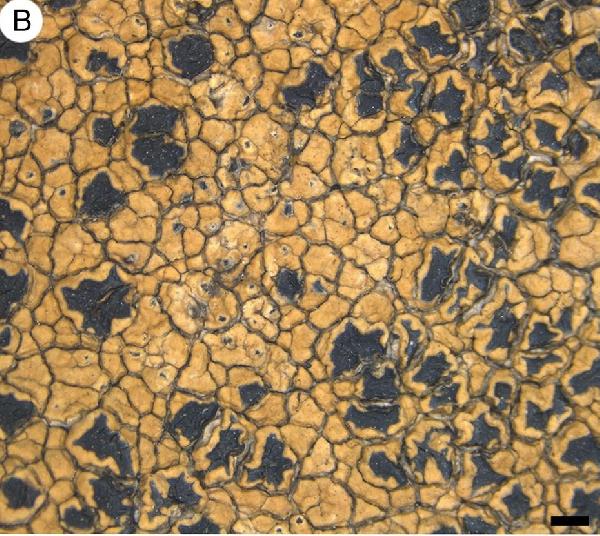
Source: Wheeler T, McCarthy J, Owe-Larsson B, Fryday A. Taxonomic innovations in Megasporaceae (lichenized Ascomycota, Pertusariales): Antidea, a new genus for Aspicilia brucei; two new species of Aspicilia, and new combinations in Aspilidea and Lobothallia. The Lichenologist. 2024;56(5):273-286. doi:10.1017/S0024282924000239 - CC-BY-NC-SA
O–L-20820
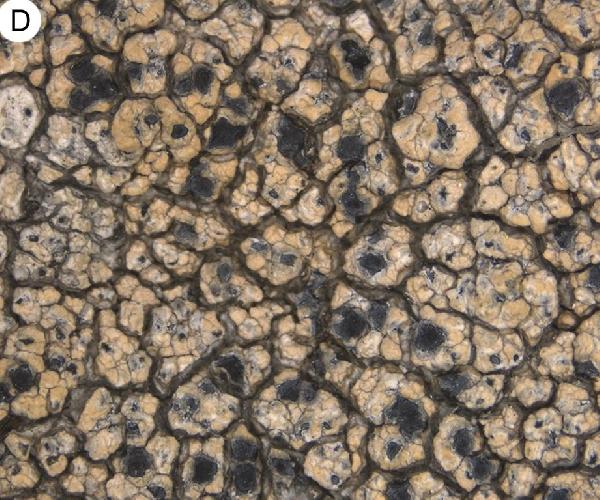
Source: Wheeler T, McCarthy J, Owe-Larsson B, Fryday A. Taxonomic innovations in Megasporaceae (lichenized Ascomycota, Pertusariales): Antidea, a new genus for Aspicilia brucei; two new species of Aspicilia, and new combinations in Aspilidea and Lobothallia. The Lichenologist. 2024;56(5):273-286. doi:10.1017/S0024282924000239 - CC-BY-NC-SA
Tønsberg 42336 Scale: 1 mm
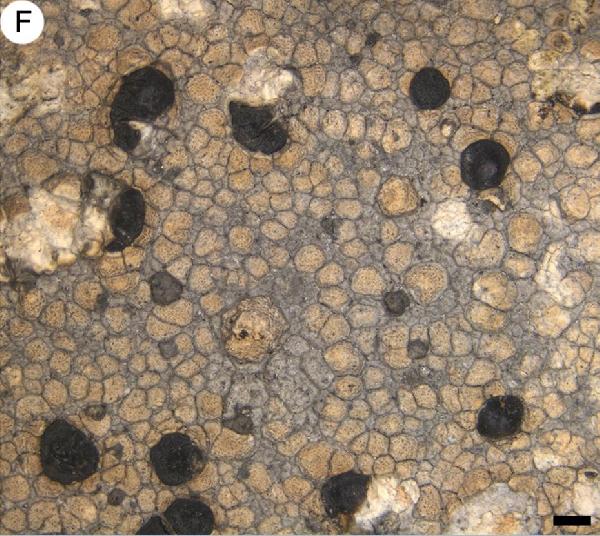
Source: Wheeler T, McCarthy J, Owe-Larsson B, Fryday A. Taxonomic innovations in Megasporaceae (lichenized Ascomycota, Pertusariales): Antidea, a new genus for Aspicilia brucei; two new species of Aspicilia, and new combinations in Aspilidea and Lobothallia. The Lichenologist. 2024;56(5):273-286. doi:10.1017/S0024282924000239 - CC-BY-NC-SA
O–L-175683 Scale: 1 mm
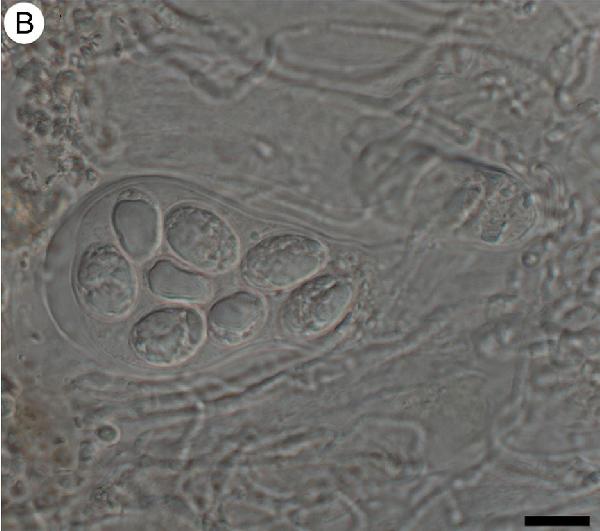
Source: Wheeler T, McCarthy J, Owe-Larsson B, Fryday A. Taxonomic innovations in Megasporaceae (lichenized Ascomycota, Pertusariales): Antidea, a new genus for Aspicilia brucei; two new species of Aspicilia, and new combinations in Aspilidea and Lobothallia. The Lichenologist. 2024;56(5):273-286. doi:10.1017/S0024282924000239 - CC-BY-NC-SA
O–L-175683 - Scale = 10 μm
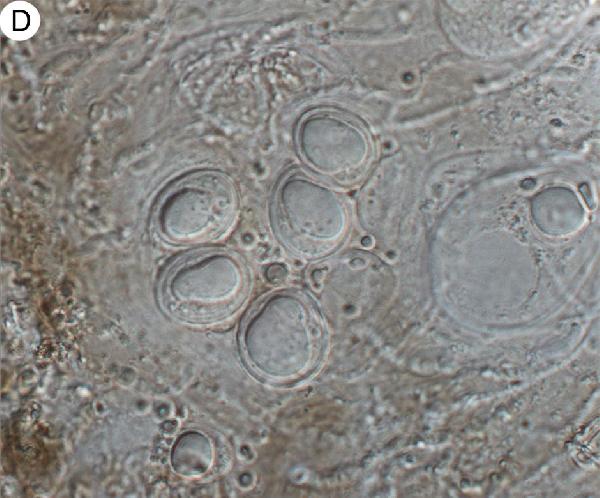
Source: Wheeler T, McCarthy J, Owe-Larsson B, Fryday A. Taxonomic innovations in Megasporaceae (lichenized Ascomycota, Pertusariales): Antidea, a new genus for Aspicilia brucei; two new species of Aspicilia, and new combinations in Aspilidea and Lobothallia. The Lichenologist. 2024;56(5):273-286. doi:10.1017/S0024282924000239 - CC-BY-NC-SA
O–L-190124 - Scale = 10 μm
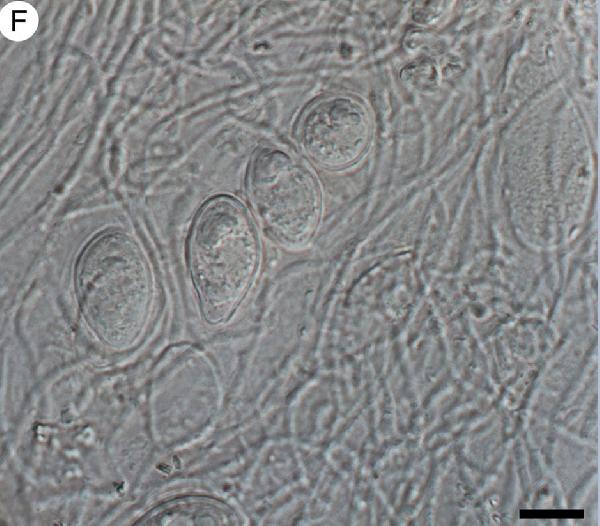
Source: Wheeler T, McCarthy J, Owe-Larsson B, Fryday A. Taxonomic innovations in Megasporaceae (lichenized Ascomycota, Pertusariales): Antidea, a new genus for Aspicilia brucei; two new species of Aspicilia, and new combinations in Aspilidea and Lobothallia. The Lichenologist. 2024;56(5):273-286. doi:10.1017/S0024282924000239 - CC-BY-NC-SA
O–L-207353 - Scale = 10 μm


Felix Schumm - CC BY-SA 4.0
[VZR8], Austria. Styria, pars Alpium "Steirisches Randgebirge, Stubalpe"
dicta, ad latera occidentalia montis Speikogel, 1900-2000 m. Ad saxa gneiseacea, in thallo Aspicilae myrini parasiticans. Leg. J. Poelt &
H. Köckinger, 1.6.1990. EX A. VEZDA: LICHENES RARIORES EXSICCATI
NR. 8. Released with Protoparmelia phaeonesos


Felix Schumm - CC BY-SA 4.0
[VZR8], Austria. Styria, pars Alpium "Steirisches Randgebirge, Stubalpe"
dicta, ad latera occidentalia montis Speikogel, 1900-2000 m. Ad saxa gneiseacea, in thallo Aspicilae myrini parasiticans. Leg. J. Poelt &
H. Köckinger, 1.6.1990. EX A. VEZDA: LICHENES RARIORES EXSICCATI
NR. 8. Released with Protoparmelia phaeonesos
Growth form: Crustose
Substrata: rocks
Photobiont: green algae other than Trentepohlia
Reproductive strategy: mainly sexual
Commonnes-rarity: (info)
Alpine belt: rare
Subalpine belt: rather rare
Oromediterranean belt: absent
Montane belt: very rare
Submediterranean belt: absent
Padanian area: absent
Humid submediterranean belt: absent
Humid mediterranean belt: absent
Dry mediterranean belt: absent

Predictive model
| Herbarium samples |

Source: Wheeler T, McCarthy J, Owe-Larsson B, Fryday A. Taxonomic innovations in Megasporaceae (lichenized Ascomycota, Pertusariales): Antidea, a new genus for Aspicilia brucei; two new species of Aspicilia, and new combinations in Aspilidea and Lobothallia. The Lichenologist. 2024;56(5):273-286. doi:10.1017/S0024282924000239 - CC-BY-NC-SA
O–L-20820

Source: Wheeler T, McCarthy J, Owe-Larsson B, Fryday A. Taxonomic innovations in Megasporaceae (lichenized Ascomycota, Pertusariales): Antidea, a new genus for Aspicilia brucei; two new species of Aspicilia, and new combinations in Aspilidea and Lobothallia. The Lichenologist. 2024;56(5):273-286. doi:10.1017/S0024282924000239 - CC-BY-NC-SA
Tønsberg 42336 Scale: 1 mm

Source: Wheeler T, McCarthy J, Owe-Larsson B, Fryday A. Taxonomic innovations in Megasporaceae (lichenized Ascomycota, Pertusariales): Antidea, a new genus for Aspicilia brucei; two new species of Aspicilia, and new combinations in Aspilidea and Lobothallia. The Lichenologist. 2024;56(5):273-286. doi:10.1017/S0024282924000239 - CC-BY-NC-SA
O–L-175683 Scale: 1 mm

Source: Wheeler T, McCarthy J, Owe-Larsson B, Fryday A. Taxonomic innovations in Megasporaceae (lichenized Ascomycota, Pertusariales): Antidea, a new genus for Aspicilia brucei; two new species of Aspicilia, and new combinations in Aspilidea and Lobothallia. The Lichenologist. 2024;56(5):273-286. doi:10.1017/S0024282924000239 - CC-BY-NC-SA
O–L-175683 - Scale = 10 μm

Source: Wheeler T, McCarthy J, Owe-Larsson B, Fryday A. Taxonomic innovations in Megasporaceae (lichenized Ascomycota, Pertusariales): Antidea, a new genus for Aspicilia brucei; two new species of Aspicilia, and new combinations in Aspilidea and Lobothallia. The Lichenologist. 2024;56(5):273-286. doi:10.1017/S0024282924000239 - CC-BY-NC-SA
O–L-190124 - Scale = 10 μm

Source: Wheeler T, McCarthy J, Owe-Larsson B, Fryday A. Taxonomic innovations in Megasporaceae (lichenized Ascomycota, Pertusariales): Antidea, a new genus for Aspicilia brucei; two new species of Aspicilia, and new combinations in Aspilidea and Lobothallia. The Lichenologist. 2024;56(5):273-286. doi:10.1017/S0024282924000239 - CC-BY-NC-SA
O–L-207353 - Scale = 10 μm


Felix Schumm - CC BY-SA 4.0
[VZR8], Austria. Styria, pars Alpium "Steirisches Randgebirge, Stubalpe" dicta, ad latera occidentalia montis Speikogel, 1900-2000 m. Ad saxa gneiseacea, in thallo Aspicilae myrini parasiticans. Leg. J. Poelt & H. Köckinger, 1.6.1990. EX A. VEZDA: LICHENES RARIORES EXSICCATI NR. 8. Released with Protoparmelia phaeonesos


 INDEX FUNGORUM
INDEX FUNGORUM
 GBIF
GBIF
 DOLICHENS
DOLICHENS


















